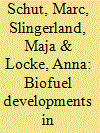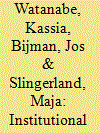|
|
|
Sort Order |
|
|
|
Items / Page
|
|
|
|
|
|
|
| Srl | Item |
| 1 |
ID:
098597


|
|
|
|
|
| Publication |
2010.
|
| Summary/Abstract |
Climate change, rising oil prices and concerns about future energy supplies have contributed to a growing interest in using biomass for energy purposes. Several studies have highlighted the biophysical potential of biofuel production on the African continent, and analysts see Mozambique as one of the most promising African countries. Favorable growing conditions and the availability of land, water and labor are mentioned as major drivers behind this potential. Moreover, the potential of biofuel production to generate socio-economic benefits is reflected in the government's policy objectives for the development of the sector, such as reducing fuel import dependency and creating rural employment. This article provides an overview of biofuel developments in Mozambique and explores to what extent reality matches the suggested potential in the country.
We conclude that biofuel developments mainly take place in areas near good infrastructure, processing and storage facilities, where there is (skilled) labor available, and access to services and goods. Moreover, our analysis shows the need to timely harmonize current trends in biofuel developments with the government's policy objectives as the majority of existing and planned projects are not focusing on remote rural areas, and - in absence of domestic markets - principally target external markets.
|
|
|
|
|
|
|
|
|
|
|
|
|
|
|
|
| 2 |
ID:
111091


|
|
|
|
|
| Publication |
2012.
|
| Summary/Abstract |
Connecting (small) family farmers to the emerging biodiesel industry requires careful design of the institutional arrangements between the producers of oil crops and the processing companies. According to institutional economics theory, the design of effective and efficient arrangements depends on production and transaction characteristics, the institutional environment, and the organizational environment supporting the transaction between producers and the industry. This paper presents a comparative study on two cases in the feedstock-for-biodiesel industry in the state of Minas Gerais, Brazil. The two case studies represent the production and transaction system of soybeans (Glycine max L. Merrill) and castor beans (Ricinus communis L.). Important elements of effective and efficient institutional arrangements are farmer collective action, availability of technical and financial support, and farmer experience with particular crops.
|
|
|
|
|
|
|
|
|
|
|
|
|
|
|
|
| 3 |
ID:
127293


|
|
|
|
|
| Publication |
2014.
|
| Summary/Abstract |
This paper describes and analyses the multi-actor governance process that made Mozambique the first African nation-state to develop a national policy framework for sustainable biofuels. The paper draws on findings from action research conducted in Mozambique between December 2008 and July 2012. We analyse interactions between the changing governance context, the course of the multi-actor governance process, and the choices in relation to governance framework characteristics and content for four successive stages of governance framework development. This provides the basis for reflection on the competences required for effective multi-actor sustainability governance, and a discussion about the role of the nation-state in sustainability governance of global economies such as biofuels.
The governance framework for sustainable biofuels has contributed to a more transparent and secure investment climate for biofuels in Mozambique. Key factors for success were (1) the presence of different types of competences during the various stages of the governance framework development, (2) closing the gap between 'licences to sell' and 'licences to produce' across different governance levels, and (3) balancing between the short- and long-term objectives for biofuel production in Mozambique and requirements of global biofuel markets. Developing-country nation-states can provide an essential contribution to these success-factors for global governance of sustainable biofuels.
|
|
|
|
|
|
|
|
|
|
|
|
|
|
|
|
|
|
|
|
|